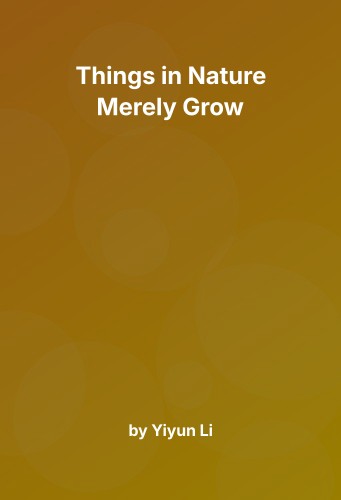Introduction: A Literary Meditation on Growth
In “Things in Nature Merely Grow,” Yiyun Li invites readers into a contemplative exploration of human experience, using the quiet persistence of nature as a guiding metaphor. Rather than offering frameworks for professional advancement or strategic leadership, Li’s work dwells in the subtle, often overlooked spaces of personal growth, resilience, and the passage of time. This summary reflects on the literary and emotional resonance of her writing, drawing out the themes, style, and narrative approach that make this book a profound reflection on what it means to live and change.
The Metaphor of Nature and the Human Condition
Li’s prose is rooted in the observation that, like the things in nature that merely grow—trees stretching imperceptibly skyward, moss spreading quietly over stone—so too do people experience change in ways that are gradual, uneven, and sometimes invisible to the naked eye. Through natural imagery, Li explores the intricacies of relationships, the persistence of memory, the slow work of healing, and the inevitability of change. Her stories and reflections do not rush toward resolution; instead, they linger in the ambiguity and complexity of life’s unfolding.
Prose Style: Precision, Contemplation, and Resonance
One of the hallmarks of Li’s writing is her precise, contemplative style. Her sentences are carefully crafted, often spare but deeply evocative, inviting the reader to slow down and notice the subtle shifts that mark the passage of time. There is an emotional resonance in her restraint; rather than dramatizing transformation, Li finds meaning in the quiet, persistent acts of endurance and adaptation. Her prose creates space for reflection, encouraging readers to attend to the ways in which life’s most significant changes often occur beneath the surface.
Key Themes
-
The Inevitability of Change: Li’s work acknowledges that change is a constant, whether welcome or unwelcome. Like the seasons, growth can be cyclical, marked by periods of flourishing and dormancy. Her characters and narrators are often caught in the tension between longing for stability and accepting the necessity of transformation.
-
Resilience and Quiet Persistence: Drawing on the resilience of living things in nature, Li’s writing celebrates the quiet strength required to endure loss, uncertainty, and disappointment. Growth, in her view, is less about triumph than about the willingness to persist, to adapt, and to find meaning in the process itself.
-
Solitude and Connection: Li explores the interplay between solitude and connection, recognizing that both are essential to personal growth. Her narratives often center on characters who find themselves alone but not necessarily lonely, discovering beauty and insight in their own company even as they reach for understanding with others.
-
Memory, Healing, and Imperfection: The passage of time and the accumulation of memory are central to Li’s meditations. She writes with sensitivity about the ways in which people carry their histories, how wounds heal imperfectly, and how beauty is often found in the fractured and unfinished.
The Emotional and Philosophical Impact
Reading “Things in Nature Merely Grow” is an invitation to pause, to reflect, and to recognize the quiet, unhurried processes that shape our lives. Li’s meditative approach offers a timeless perspective on growth, one that honors both the inevitability of change and the dignity of persistence. Her work encourages readers to embrace imperfection, to find solace in the ordinary, and to trust in the slow, organic unfolding of their own stories. In a world that often demands urgency and certainty, Yiyun Li’s literary vision reminds us of the profound beauty in simply allowing ourselves to grow.

